|
|
|
Sort Order |
|
|
|
Items / Page
|
|
|
|
|
|
|
| Srl | Item |
| 1 |
ID:
102807


|
|
|
|
|
| Publication |
2011.
|
| Summary/Abstract |
IN THE MIDDLE of 1966, when ASEAN was only being contemplated, Foreign Minister of Malaysia Ismail Abdul Rahman said: "We look forward to a regional association embracing Thailand, Burma, Indonesia, Singapore, Malaysia, the Philippines, Cambodia, Laos, and Vietnam. We have no choice. We, the nations and peoples of Southeast Asia, whatever our ethnic, cultural and religious background may be, must pull together and create, with hand and brain, a new perspective and a new framework. And we must do it ourselves. We must create a deep, collective awareness that we cannot survive for long as independent peoples ... unless we also think and act as Southeast Asians."1
The framework, put in place one year later, by Indonesia, Malaysia, Singapore, Thailand, and the Philippines, was, strictly speaking, a sub-regional rather than regional by nature. It was unrealistic to create in Southeast Asia anything larger under the rules of a bipolar world. As long as these rules applied, the sole country, that joined the five founding members of ASEAN, was Brunei (1984). Even so, the sense of alienation prevailing among neighboring countries in Southeast Asia began to gradually subside. When the Cold War ended, adversaries of not long ago began turning to the Association, and they were not spurned at all. In 1995, Vietnam became full member of ASEAN with Laos and Myanmar following suit in 1997. When Cambodia joined in 1999, ASEAN had ten members thus fulfilling the dream of its founding fathers of full regional unity.
|
|
|
|
|
|
|
|
|
|
|
|
|
|
|
|
| 2 |
ID:
102819
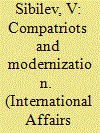

|
|
|
|
|
| Publication |
2011.
|
| Summary/Abstract |
ON 7-8 OCTOBER, 2010, the World Thematic Conference "On the Contribution by Compatriots to Russia's Modernization: Opportunities for the Development of Partner Relations" was held in Moscow under the aegis and with the support of the Government Commission on Compatriots Living Abroad and the Russian Ministry of Foreign Affairs.
More than 140 compatriots from 76 countries of the world, as well as representatives of the federal legislative and executive power bodies, business structures, scientific and medical institutions and associations, publishers, the media, and nongovernmental organizations took part in the conference.
|
|
|
|
|
|
|
|
|
|
|
|
|
|
|
|
| 3 |
ID:
102814


|
|
|
| 4 |
ID:
102815
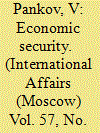

|
|
|
|
|
| Publication |
2011.
|
| Summary/Abstract |
THE WORLD ECONOMIC CRISIS of 2008-2010 has highlighted a number of world economic problems, reminding us once again of their global nature. Among these, particular attention should be paid to the problem of national and international economic security (ES) with its essential, closely interrelated but relatively independent aspects such as food, financial, energy and environmental security. In these conditions, quite logically, publications on ES problems that were so widespread in the last decade of the 20th century in view of the upheavals associated with the collapse of "real (actually existing) socialism" have once again become, though for different reasons, a more noticeable phenomenon in Russian and foreign literature.
|
|
|
|
|
|
|
|
|
|
|
|
|
|
|
|
| 5 |
ID:
102810


|
|
|
|
|
| Publication |
2011.
|
| Summary/Abstract |
SINCE THE LATE 1980S, the world economic system has been oriented at the principles of liberalism; no effort was spared to plant them in the minds of all subjects of international economic relations irrespective of their readiness to accept the "open markets" policy. Great Britain and the United States, two main ideologists of economic liberalism, preferred to keep in the shade the fact that their domestic markers had remained closed for imports while their national economies had been taking shape under an umbrella of various forms of protectionism.
Mercantilism, the cornerstone of the modern theory of international trade, describes economic assets of any country represented by bullion (gold and silver) as an evidence of its wealth increased through a positive balance of trade with other nations and ensured by unequal exchange.
|
|
|
|
|
|
|
|
|
|
|
|
|
|
|
|
| 6 |
ID:
102820


|
|
|
|
|
| Publication |
2011.
|
| Summary/Abstract |
OUR STORY begins with the flight. Everything went as usual - off we go, our friends wave us goodbye, we reach our gate, and then we sit around for another hour waiting to board the plane. The service personnel show up, they take away our water bottles, they check everything again... And finally we are allowed onto the plane.
|
|
|
|
|
|
|
|
|
|
|
|
|
|
|
|
| 7 |
ID:
102831
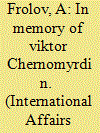

|
|
|
|
|
| Publication |
2011.
|
| Summary/Abstract |
ON 3 NOVEMBER, 2010, Viktor Stepanovich Chernomyrdin - a man who made history, a strong manager, a "red director," a production organizer, a national minister, and a political heavyweight, just to give a few of the ways he was described - passed away. I would also add that a lifetime diplomat, skilled in negotiations and compromises, passed away. His friends and family called him simply Stepanich, while his coworkers kept it even shorter - boss. And when calling Russian leaders by their initials became popular, he was the first for whom it naturally took hold - CheVeEs. It is difficult to present a more or less complete picture of this man's activity within the scope of one article, so I will draw only a few lines of his portrait based on my personal observations and contacts with him.
|
|
|
|
|
|
|
|
|
|
|
|
|
|
|
|
| 8 |
ID:
102803
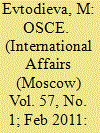

|
|
|
|
|
| Publication |
2011.
|
| Summary/Abstract |
THIRTY-FIVE YEARS AGO, on August 1, 1975, the famous Helsinki agreements on security and cooperation in Europe were signed, ushering in a new era of cooperation between the European countries with different social systems. These agreements, which enshrined the inviolability of the European borders, reaffirmed the immutability of the results of World II and the 1945 Potsdam Conference. The nations participating in the Helsinki negotiations (35 in all) developed a code of principles that the European States were to follow in their relations and also laid down the groundwork for transparency and trust between the States of the "Western" and "Eastern" blocs in the military sphere. In particular, the text of the Helsinki Final Act incorporated documents on advance notice of major military exercises and other confidence-building measures, which subsequently played a key role in the evolution of the European security system.
|
|
|
|
|
|
|
|
|
|
|
|
|
|
|
|
| 9 |
ID:
102829


|
|
|
|
|
| Publication |
2011.
|
| Summary/Abstract |
THE VERY TITLE of Roman Silantiev's book Musulmanskaia diplomatia v Rossii. Istoria i sovremennost* (Muslim Diplomacy in Russia: Past and Present) causes surprise or even an inner protest: it looks as if the author has moved away from diplomacy as a foreign policy instrument to look at it as an art of tactfulness. In anticipation, the author has introduced the book with his own interpretation of the trends of Muslim diplomacy; he refers to the relationships with the Muslims in other countries and with followers of other Muslim trends and other religions as well as with political and public organizations. The second out of five types of relationships - "relationships with the authorities of their own (non-Islamic) state and with authorities of other countries" - intensifies the feeling of protest. This makes the book to look somehow undiplomatic on the domestic scene.
|
|
|
|
|
|
|
|
|
|
|
|
|
|
|
|
| 10 |
ID:
102802


|
|
|
|
|
| Publication |
2011.
|
| Summary/Abstract |
WHERE IS NATO going? Recently the question has moved to the center of attention of the analytical, academic and diplomatic communities in Russia and abroad. The Portuguese are as concerned as the rest of the world. Indeed, the disappearance of the Soviet Union left its ideological adversary, the North Atlantic Alliance, a Cold War product, at a crossroads. The NATO-centrism principle cracked under the impact of the multi-polar world which has finally taken shape. In recent years, few sided with the deliberations about NATO as the cornerstone of global security and the "world policeman": this is popular only among certain NATO members still living in the past. The European security and defense policy for each member state, the core of the EU Security Doctrine, envisaged stronger extra-NATO military capabilities. Passions flew high at the numerous scientific-political seminars held in Lisbon on the eve of the NATO summit; some people doubted that the world still needed NATO at all. A sort of "know-how" was required to preserve the accumulated potential and go on living while the member-countries were slashing their military budgets. In 2011, the NATO staff will be trimmed from 13.5 to 9 thousand; 7 command and control structures will replace the present 11. NATO will concentrate at supplies, purchases, maintenance, logistics, communications, and intelligence. The means as well as the aims were in short supply: NATO needed at least a hypothetical or, better still, potential enemy.
|
|
|
|
|
|
|
|
|
|
|
|
|
|
|
|
| 11 |
ID:
102811


|
|
|
|
|
| Publication |
2011.
|
| Summary/Abstract |
LIKE DEFENSE MECHANISMS in any living thing designed to constantly cope with changing reality and protect them against harmful factors, defense mechanisms of a state, which still hinge on its armed forces, ought to evolve to be able at any moment to adequately react to modern challenges and threats. The development level of these defense mechanisms, their modernity and efficiency, their attractiveness at home and abroad are good indicators of the health and robustness of the state as an organism.
Renovation, optimization and modernization are processes that must be taking place constantly in the system of armed forces, otherwise this system is doomed to stagnation and lagging behind which is difficult and costly to end. Germany is currently trying to make up for precisely this kind of lagging behind.
|
|
|
|
|
|
|
|
|
|
|
|
|
|
|
|
| 12 |
ID:
102818


|
|
|
| 13 |
ID:
102800


|
|
|
| 14 |
ID:
102797


|
|
|
| 15 |
ID:
102808


|
|
|
|
|
| Publication |
2011.
|
| Summary/Abstract |
Armen Oganesyan, Editor-in-Chief, International Affairs: Mrs. Ambassador, allow me to congratulate you on the start of your mission in Russia. On October 18, you presented your credentials to President DA. Medvedev. If it is not a secret, what did you manage to tell him and what did he tell you during the brief minutes of your exchange.
Dorit Golender, Ambassador Extraordinary and Plenipotentiary of the State of Israel to the Russian Federation: First of all, thank you for your congratulations. Naturally, the presentation of my credentials has been the most significant day since my arrival here. Generally, it is one of the most significant days in my life. The immense importance of this event can only be appreciated by a person who is present at this moment in the hall, at this ceremony, in this atmosphere. Naturally, as prescribed by the protocol, after the presentation of the credentials there was the shaking of hands and there were remarks, brief but very meaningful. After shaking my hand, Mr. President said that we will work together, and we will work well. I believe that what I heard at that moment is very important, especially for countries that are at the peak of their relations.
|
|
|
|
|
|
|
|
|
|
|
|
|
|
|
|
| 16 |
ID:
102806


|
|
|
|
|
| Publication |
2011.
|
| Summary/Abstract |
SEPTEMBER 17, 2010 marks 20 years of the reopening of the diplomatic missions of the Kingdom of Saudi Arabia (KSA) and the Russian Federation (RF) on the ambassadorial level. People in today's Saudi Arabia still remember and value the fact that the Soviet Union was the first country to recognize in 1926 what was at then the Kingdom of Nejd and Hejaz. The foundations of business cooperation were laid in those distant times. It may sound odd today, but one of the key items of Soviet export to Saudi Arabia, before they had discovered major petroleum deposits there, was kerosene; and in the 1930s, Russian aviator Nikolai Naidenov and aircraft technician Maksimov were helping King Abdul Azis Ibn Saud with organizing the kingdom's air fleet. Regretfully, the tragic events in the 1930s in Soviet Russia dealt a crippling blow to Russian-Saudi relations. When the Soviet diplomats Nazir Tiuriakulov and Karim Khakimov were recalled from Saudi Arabia and subjected to political repression in 1937-1938, King Saud refused to receive any other Soviet plenipotentiary representative and, in 1938, diplomatic relations between the USSR and Saudi Arabia were frozen for many decades to come.
|
|
|
|
|
|
|
|
|
|
|
|
|
|
|
|
| 17 |
ID:
102812
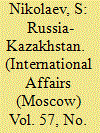

|
|
|
|
|
| Publication |
2011.
|
| Summary/Abstract |
TODAY IT IS COMMON for regions throughout the world, especially border regions, to make an increasing contribution to the development of interstate ties. Relations between Russia and Kazakhstan can serve as a model in this respect. The 7th Russia-Kazakhstan Interregional Cooperation Forum, held in Ust-Kamenogorsk (Kazakhstan) on 6-7 September 2010, is a good occasion for assessing the state and prospects of this cooperation format.
These (already traditional) forums have their own history. They originated as cross-border forums, and this was only natural because Russia and Kazakhstan share a border more than 7.5 thousand kilometers long. Twelve constituent entities of the Russian Federation (Altai Republic, Altai Krai, and the Astrakhan, Volgograd, Kurgan, Novosibirsk, Omsk, Orenburg, Samara, Saratov, Tyumen, and Chelyabinsk regions) border on seven regions of Kazakhstan (Aktobe, Atyrau, East Kazakhstan, West Kazakhstan, Kostanay, Pavlodar, and North Kazakhstan).
|
|
|
|
|
|
|
|
|
|
|
|
|
|
|
|
| 18 |
ID:
102828


|
|
|
|
|
| Publication |
2011.
|
| Summary/Abstract |
On 25 March, 1975, King Faisal of Saudi Arabia, who was called "the most powerful Arab ruler in centuries," the monarch of a country holding a quarter of the planet's oil supplies and home to Mecca and Medina - the two main Muslim sacred places - was receiving a delegation from Kuwait in his palace before television cameras. His nephew Faisal bin Musaid suddenly walked up to him. As the king bent to kiss the young man, the latter pulled out a gun and fired three times. So did the life of an outstanding Saudi monarch tragically end...
|
|
|
|
|
|
|
|
|
|
|
|
|
|
|
|
| 19 |
ID:
102813


|
|
|
| 20 |
ID:
102809


|
|
|
|
|
| Publication |
2011.
|
| Summary/Abstract |
OH WELL, this feels great. You come to the Crimea and hear at the passport checkpoint in the Simferopol airport: "With your passport you do not need an immigration card." A TV picture of Medvedev and Yanukovich criticizing the borderline idiocy comes to mind followed by a puzzled question: "Why did they distribute the cards on board in the first place rather than telling us the great news?"
Well, let it be. The ice is breaking after all, to borrow a quote from a classic while the "jurors" of the Russian-Ukrainian relations having safely landed in the Crimea began their preparations for a conference organized by the International Affairs journal with the support of the Foreign Ministry of Russia.
|
|
|
|
|
|
|
|
|
|
|
|
|
|
|
|
|
|
|
|
|